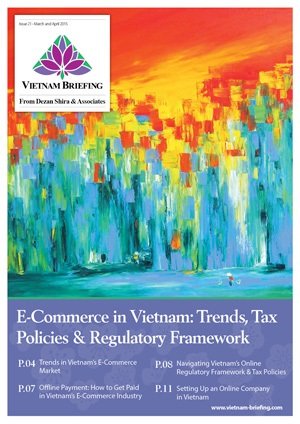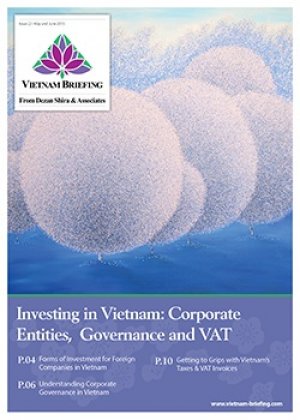Impact of the New Law on Enterprises on Vietnam’s Corporate Governance
 By Charles Small and Thao Dang, Dezan Shira & Associates
By Charles Small and Thao Dang, Dezan Shira & Associates
The foundations of Vietnam’s corporate governance system are the Law on Enterprises, the Law on Securities, and companies’ charters, constructed based on the Law on Enterprises.
The Law on Enterprises 2014, which came into effect on July 1, 2015, sets out obligatory governance structures for different types of companies. In particular, the internal governance structures of enterprises in Vietnam depend on the legal form of the companies, the number of shareholders when the Control Board was established, and the status of ownership. For example, the governance structure of a single-member Limited Liability Company (LLC) owned by an organization is different from that of a single-member LLC owned by an individual.
At the time of writing, the necessary implementing regulations have not been released for either the Law on Enterprises or the Law on Investment, which came into effect simultaneously. As implementing regulations under the old laws are no longer valid, and new regulations have not been issued, corporate establishment in Vietnam is on hold for now. Situations like this, all too common in Vietnam’s developing legal system, show why you need to employ a consulting firm on the pulse of regulatory changes.
 RELATED: Dezan Shira & Associates’ Corporate Establishment Services
RELATED: Dezan Shira & Associates’ Corporate Establishment Services
It was not until the Law on Enterprises 2005 came into force, that the foundations of Vietnam’s corporate governance legal framework were established. Currently, there are no specific legal documents about corporate governance regulation for foreigners or locals on operating businesses in Vietnam.
The Law on Enterprises 2014 as it stands, without the necessary implementing regulations, may lead to somewhat unclear allocation of power among the governance bodies of a company. Specifically, the director/general director is responsible for managing and making decision on matters with regard to daily business operations of the company. However, this law gives the Board of Directors (BOD) the right to decide on issues that do not fall under the scope of the General Meeting of Shareholders (GMS). There could be overlaps between the BOD and the director/general director’s responsibilities, which may lead to a loss of accountability within the company.
Improvements to the corporate governance framework under the new Law on Enterprises 2014 include permitting LLCs or joint-stock companies (JSCs) to have more than one legal representative, enabling daily business operations to run smoothly and efficiently. The company’s charter must specify the number, position, authority and obligations of all legal representatives of the company.
In terms of holding a meeting of the Members’ Council in an LLC, under the new law, attending members must hold at least 65 percent of charter capital. This compares to a minimum of 75 percent of charter capital under the Law on Enterprises 2005. For a JSC, it is required that the attending shareholders own a minimum of 51 percent of voting shares for the first attempt to convene a meeting of the GMS, which was 65 percent under the old law. For the second attempt, the requirements are reduced to 33 percent. These reductions ease the process of conducting meetings of relevant governance bodies.
 RELATED: Investing in Vietnam: Corporate Entities, Governance and VAT
RELATED: Investing in Vietnam: Corporate Entities, Governance and VAT
Another important change is in the voting threshold required to approve resolutions. For an LLC, decisions are to be passed in the form of written opinion by the members holding at least 65 percent of charter capital, compared to 75 percent under the Law on Enterprises 2005. For a JSC, resolutions on specific matters or prescribed in the company’s charter shall be approved by shareholders with at least 65 percent of votes, which was also 75 percent under the old law. Only 51 percent of voting shares are required to pass resolutions on other matters, facilitating the corporate approval process.
Further Support from Dezan Shira & Associates
Dezan Shira & Associates can service companies which are looking to further develop their operations in Vietnam. The firm can help companies establish a direct office in the country and can guide them through the affiliated tax, legal and HR issues that come with doing so. To arrange a free consultation, please contact us at: vietnam@dezshira.com
|
Asia Briefing Ltd. is a subsidiary of Dezan Shira & Associates. Dezan Shira is a specialist foreign direct investment practice, providing corporate establishment, business advisory, tax advisory and compliance, accounting, payroll, due diligence and financial review services to multinationals investing in China, Hong Kong, India, Vietnam, Singapore and the rest of ASEAN. For further information, please email vietnam@dezshira.com or visit www.dezshira.com. Stay up to date with the latest business and investment trends in Asia by subscribing to our complimentary update service featuring news, commentary and regulatory insight. |
Investing in Vietnam: Corporate Entities, Governance and VAT
In this issue of Vietnam Briefing Magazine, we provide readers with an understanding of the impact of Vietnam’s new Laws on Enterprises and Investment. We begin by discussing the various forms of corporate entities which foreign investors may establish in Vietnam. We then explain the corporate governance framework under the new Law on Enterprises, before showing you how Vietnam’s VAT invoice system works in practice.

E-Commerce in Vietnam: Trends, Tax Policies & Regulatory Framework
In this issue of Vietnam Briefing Magazine, we provide readers with a complete understanding of Vietnam’s e-commerce industry. We begin by highlighting existing trends in the market, paying special attention to scope for foreign investment. We look at means for online sellers to receive payment in Vietnam, examine the industry’s tax and regulatory framework, and discuss how a foreign retailer can actually establish an online company in Vietnam.
 Tax, Accounting, and Audit in Vietnam 2014-2015
Tax, Accounting, and Audit in Vietnam 2014-2015
The first edition of Tax, Accounting, and Audit in Vietnam, published in 2014, offers a comprehensive overview of the major taxes foreign investors are likely to encounter when establishing or operating a business in Vietnam, as well as other tax-relevant obligations. This concise, detailed, yet pragmatic guide is ideal for CFOs, compliance officers and heads of accounting who need to be able to navigate the complex tax and accounting landscape in Vietnam.
- Previous Article Investing in Vietnam: Corporate Entities, Governance and VAT – New Issue of Vietnam Briefing Magazine
- Next Article Sign of a Deepening Relationship: Vietnam’s Communist Party Leader Visits the United States










